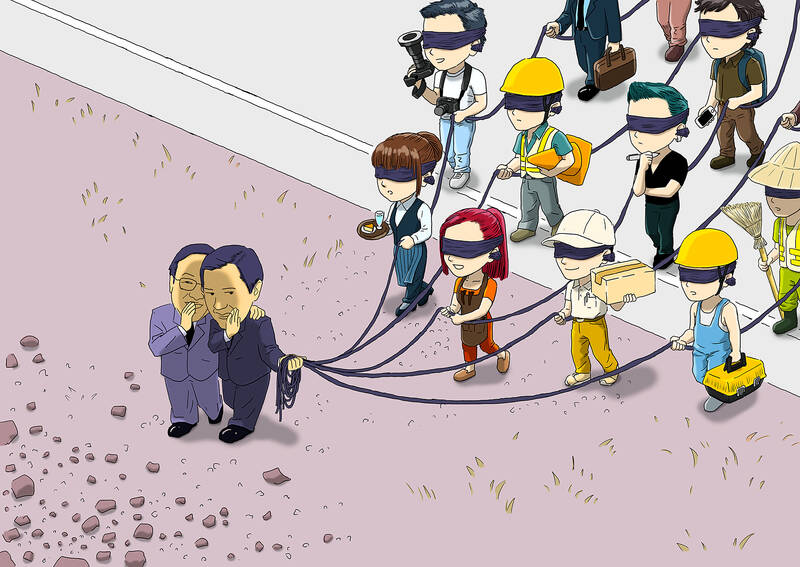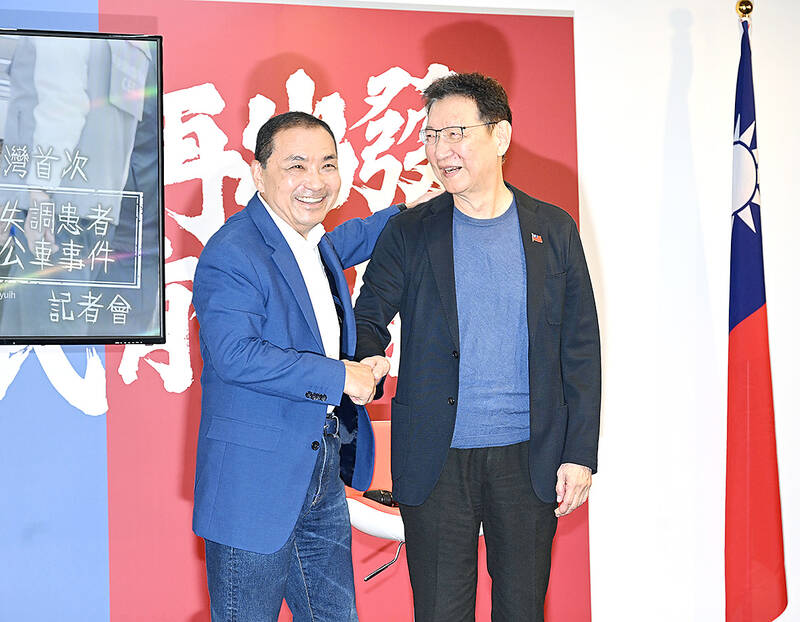In central Taiwan, a friend informs me, there’s a major business man, definitely not a gangster, who also has operations in the People’s Republic of China (PRC). Before the Democratic Progressive Party (DPP) took over in 2016, he had plans to hand out “student” visas for “internships” for his young workers in the PRC, who would then come here for “study.” They would provide him with free labor for his entertainment operations here, and then return to the PRC to work in his businesses there.
Recently Chinese Nationalist Party (KMT) presidential candidate Hou You-yi (侯友宜) announced that he would open the gates to Chinese students. The visa program already suffers from egregious systemic abuses and lax oversight, as repeated cases of non-white students used as factory labor show. With Hou in power, this might well become institutionalized. And people like the businessman above will benefit.
I have written elsewhere how presidential candidates Ko Wen-je (柯文哲) of the Taiwan People’s Party (TPP) and Hou have used the 2008 and 2012 approach of former President Ma Ying-jeou (馬英九) of the KMT to try and appeal to local voters while maintaining their deep blue identity (Taipei Times, “The ‘services pact’ rises from its grave,” June 26, 2023). Ko has been slowly falling in the polls since the KMT’s successful attempt to badly wound him with the faux “joint ticket” plan (Taipei Times, “Hou-Ko: 2008 redux,” Nov. 27, 2023).

Photo courtesy of Wikimedia Commons
Hou, however, has risen a bit in the polls as voters shift around.
In the last few weeks Ma has encysted Hou in a cocoon of deep blue Mainlander politicians. His campaign manager is Ma’s hatchet man, King Pu-tsun (金溥聰). His Vice Presidential candidate is a deep-blue bitter-ender and media personality Jaw Shaw-kong (趙少康). If the KMT wins the legislature, the speaker will be another deep blue mainlander, Han Kuo-yu (韓國瑜), the KMT’s 2020 presidential failure.
Surrounding Hou with deep blue mainlanders was Ma’s way of consolidating the deep blue base and reassuring the aging mainlander core of the party that the Taiwanese Hou would remain under Party control. It also means that Hou’s major policies are likely to be reprises of the Ma era. The KMT is offering nothing new.

Photo: Peter Lo, Taipei Times
Hou has already announced that he supports reviving the cross-strait service trade agreement (CSSTA), the unpopular services pact that the Sunflower movement killed in 2014. The expansion in PRC students is of course vintage Ma, part of Ma’s larger project of bringing Chinese over any way possible. Ma also proposed the “free economic zones,” essentially miniature banana republics, to bring in Chinese labor. At the time DPP Legislator Wu Ping-jui (吳秉叡) said: “Thirty-three of the 73 articles in the special act are blank authorizations, which give almost unlimited authority to administrative bodies of the free economic pilot zones.”
Ma’s China policies also called for financial integration of Taiwan with China. In his 2013 Double Ten day speech he expressed the hope that the free economic zones would include financial services. Because the zones were largely outside government regulation, the central bank killed the idea, arguing that it would enable unregulated trade of the Taiwan Dollar with the outside world.
Worse than that, as many noted at the time, banks would have been able to move transactions into the zones, thus placing them outside financial regulations. The spike in financial fraud would have been gargantuan. CommonWealth Magazine documented last month in an excellent article on Taiwan’s booming fraud industry, “Taiwan’s White Collar Fraud Infiltrating Banks,” that financial fraud is booming and that there are now more fraudsters than drug criminals in Taiwan’s prisons.
Why has Hou revived the trade agreement? Because the ultimate goals of Ma’s China policy were always financial integration and flooding Taiwan with Chinese, in any way possible. Financial integration was in turn about getting Chinese Communist Party (CCP) money into Taiwanese financial firms and subordinating them to the PRC, part of the PRC’s long-term plan to subsume Taiwan. Given China’s current economic woes, imagine if Ma had been successful and Taiwanese financial firms were even more exposed in that market.
Few now remember the AIG-Nan Shan-Primus deal of 2010, which brewed into a major scandal. AIG sold Nanshan, then Taiwan’s largest insurer with 4 million Taiwanese under its coverage, to Primus Financial for US$2.15 billion. Over the spring it emerged that the consortium backing Primus included individuals under suspicion of financial crimes and irregularities, CCP princelings, money from state firms and shell companies in terrible financial shape. It was a whirlpool of murky money flows and, as a sturdy Taipei Times editorial (“The devil is in the details,” April 2, 2010) noted at the time, an augury of the future.
These policies are already on full replay. This fall Ma visited New York, where he hobnobbed with his old pal Jerome Cohen, who writes often on Ma, and always extolling him, even for tiniest things, as in 2009 when Cohen wrote in the Wall Street Journal explaining why it was so wonderful that Ma had broken his promise not to run for KMT party chairman while president (Taipei Times, “Chairman Ma’s Challenge,” July 27, 2009).
On that visit Ma was interviewed by Stephen A Orlins, head of the National Committee on US-China Relations (NCUSCR) and before that, of Lehman and Carlyle, both powerful financial firms. Like Ma, he has old connections to Cohen. A month later Orlin’s NCUSCR, along with the equally pro-PRC US-China Business Council, would go on to organize the infamous dinner with Xi Jinping (習近平) on Nov. 15 at the Asia-Pacific Economic Cooperation summit, at which hundreds of US business leaders feted the dictator and mass murderer.
If Hou ever becomes president, I expect US financial leaders to put great pressure on Taiwan to engage in “financial integration” with its mortal enemy, and a Hou administration to attempt to open the nation to PRC financial firms.
This will be presented as a “peace” move, and accompanied by clouds of “pro-peace” articles in the major media from the usual suspects, like B-17s tossing out chaff before hitting Hamburg.
Unless PRC troops actually hit Taiwan’s beaches, that will be Taiwan’s most desperate fight. I hope we never have to face it.
Notes from Central Taiwan is a column written by long-term resident Michael Turton, who provides incisive commentary informed by three decades of living in and writing about his adoptive country. The views expressed here are his own.

Last week, the the National Immigration Agency (NIA) told the legislature that more than 10,000 naturalized Taiwanese citizens from the People’s Republic of China (PRC) risked having their citizenship revoked if they failed to provide proof that they had renounced their Chinese household registration within the next three months. Renunciation is required under the Act Governing Relations Between the People of the Taiwan Area and the Mainland Area (臺灣地區與大陸地區人民關係條例), as amended in 2004, though it was only a legal requirement after 2000. Prior to that, it had been only an administrative requirement since the Nationality Act (國籍法) was established in

Three big changes have transformed the landscape of Taiwan’s local patronage factions: Increasing Democratic Progressive Party (DPP) involvement, rising new factions and the Chinese Nationalist Party’s (KMT) significantly weakened control. GREEN FACTIONS It is said that “south of the Zhuoshui River (濁水溪), there is no blue-green divide,” meaning that from Yunlin County south there is no difference between KMT and DPP politicians. This is not always true, but there is more than a grain of truth to it. Traditionally, DPP factions are viewed as national entities, with their primary function to secure plum positions in the party and government. This is not unusual

The other day, a friend decided to playfully name our individual roles within the group: planner, emotional support, and so on. I was the fault-finder — or, as she put it, “the grumpy teenager” — who points out problems, but doesn’t suggest alternatives. She was only kidding around, but she struck at an insecurity I have: that I’m unacceptably, intolerably negative. My first instinct is to stress-test ideas for potential flaws. This critical tendency serves me well professionally, and feels true to who I am. If I don’t enjoy a film, for example, I don’t swallow my opinion. But I sometimes worry

US President Donald Trump’s bid to take back control of the Panama Canal has put his counterpart Jose Raul Mulino in a difficult position and revived fears in the Central American country that US military bases will return. After Trump vowed to reclaim the interoceanic waterway from Chinese influence, US Defense Secretary Pete Hegseth signed an agreement with the Mulino administration last week for the US to deploy troops in areas adjacent to the canal. For more than two decades, after handing over control of the strategically vital waterway to Panama in 1999 and dismantling the bases that protected it, Washington has